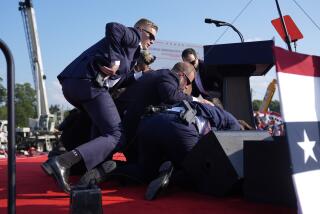Obama’s pick for Homeland Security must win over Republican skeptics
WASHINGTON — When Jeh Johnson, President Obama’s pick to run the Department of Homeland Security, moved to Washington to be the top lawyer at the Pentagon in 2009, he launched a charm offensive.
He began to hold regular dinners with former George W. Bush administration lawyers and Republican congressional staff. Some were held at an expensive organic restaurant called Nora in downtown D.C., recalls John B. Bellinger III, who served as legal adviser for the State Department and the National Security Council during the Bush administration.
“He was a good listener,” Bellinger said, adding that Johnson was an important voice in maintaining continuity in military and counter-terrorism policy from the Bush years to Obama’s administration. “He knew that it’s good to have friends on both sides of the aisle.”
Johnson, whose nomination was formally announced by Obama on Friday, will need that political touch if he is confirmed to manage one of the largest, most besieged departments in the federal government. Homeland Security has struggled to streamline how it shares information on domestic terrorism threats and helps protect crucial American businesses from cyber attacks.
He will be under pressure from immigration advocates to slow down the rate of deportations, which have ticked up every year that Obama has been in office. Unions representing immigration officers are in open revolt over the Obama administration’s orders that agents focus on removing immigrants with criminal records before others.
Though the job requires a deft understanding of ways to prevent terrorists from launching attacks inside the U.S., Johnson also will be front and center in helping Obama achieve one of his top goals for his second term: convincing Congress to overhaul the country’s immigration system.
Johnson has been in the White House situation room “in moments of decision,” Obama said during a news conference in the Rose Garden, and has a “deep understanding of the threats and challenges facing the United States.”
At the same time, Obama said, Johnson knows “that keeping America safe requires us also upholding the values and civil liberties that make America great.”
Raised in Wappingers Falls, N.Y., Johnson graduated from Columbia Law School and completed his undergraduate studies at Morehouse, a historically black college in Atlanta.
In his 30s, Johnson was made a partner in the high-powered New York law firm Paul, Weiss, Rifkind, Wharton & Garrison. Johnson left the firm to work in public service multiple times. He tried corruption cases as a federal prosecutor in New York and later, during the Clinton administration, worked as general counsel to the Air Force.
In 2008, he was an early fundraiser and adviser to Obama’s presidential campaign. If confirmed by the Senate, he would be the fourth Homeland Security secretary and the first African American to serve in the post.
Republicans are already questioning whether he has the experience needed to take the reins of an agency with 240,000 employees, or whether he was chosen simply because he is a crony of the president’s.
Sen. Jeff Sessions (R-Ala.) said that Johnson would have to demonstrate to the Senate a “commitment to achieving management control of this sprawling department and its law enforcement duties.”
Johnson would succeed Janet Napolitano, who stepped down in September to run the University of California system. As a former governor of Arizona, Napolitano came to Washington with strong border security credentials and political instincts.
Johnson doesn’t have a long public record on immigration, which could blunt objections to his nomination from opponents of the White House’s immigration policy.
Because Johnson helped to establish the controversial legal framework for lethal drone strokes, his nomination could step up the pressure on the Obama administration to pull back the curtains further on those secret operations.
Former Bush administration officials praised Johnson for pushing to keep in place the military commissions court system for trying terrorism suspects established after the Sept. 11, 2001, attacks. Some of the reforms to the commissions under Obama’s watch were designed by Johnson, including limiting the use of hearsay evidence.
Sandy Hodgkinson, who had high-level positions in the Pentagon under Bush and Obama, said, “There were sharp contrasts in the proposed national security policies between the two administrations. He was the person who helped bridge them.”
“He certainly will bring a sharp analytic mind and a questioning style to an agency that really needs good leadership right now,” Hodgkinson said.
While at the Pentagon, Johnson helped lead a high-level working group that advised Obama that repealing the military’s “don’t ask, don’t tell” policy on gays in the military would pose little risk to the effectiveness of the force. He has described this work to friends as one of his proudest moments in public service.
Standing next to the president in the White House Rose Garden on Friday, Johnson told Obama he would do his best, even though he “was not looking for this opportunity” and was settling back into private life when it came along.
Johnson recalled being in New York City on the day two jetliners rammed into the former World Trade Center towers.
“I wandered the streets of New York that day and wondered, ‘What can I do?’” Johnson said. “Since then I have tried to devote myself to answering that question.”
More to Read
Sign up for Essential California
The most important California stories and recommendations in your inbox every morning.
You may occasionally receive promotional content from the Los Angeles Times.












